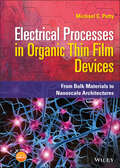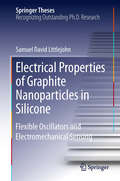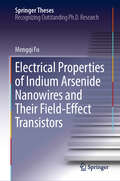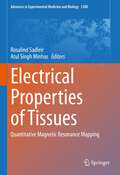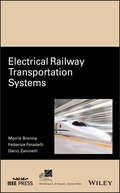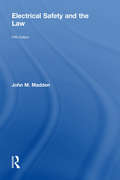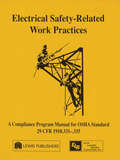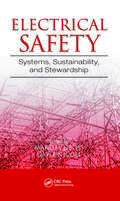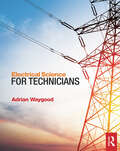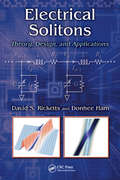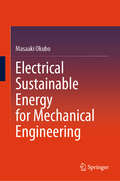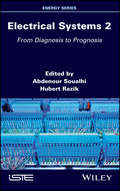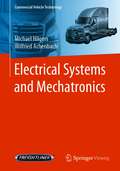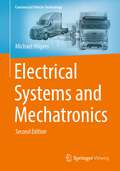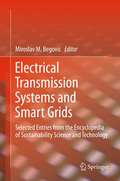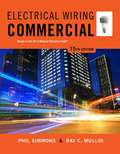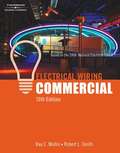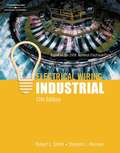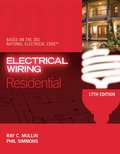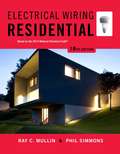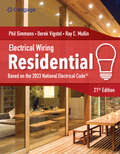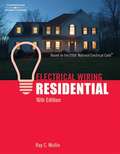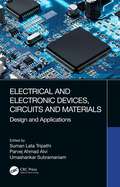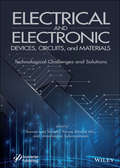- Table View
- List View
Electrical Processes in Organic Thin Film Devices: From Bulk Materials to Nanoscale Architectures
by Michael C. PettyElectrical Processes in Organic Thin Film Devices A one-stop examination of fundamental electrical behaviour in organic electronic device architectures In Electrical Processes in Organic Thin Film Devices: From Bulk Materials to Nanoscale Architectures, distinguished researcher Michael C. Petty delivers an in-depth treatment of the electrical behaviour of organic electronic devices focused on first principles. The author describes the fundamental electrical behaviour of various device architectures and offers an introduction to the physical processes that play a role in the electrical conductivity of organic materials. Beginning with band theory, the text moves on to address the effects of thin film device architectures and nanostructures. The book discusses the applications to devices currently in the marketplace, like displays, as well as those under development (transistors, solar cells, and memories). Electrical Processes in Organic Thin Film Devices also describes emerging organic thin film architectures and explores the potential for single molecule electronics and biologically inspired devices. Finally, the book also includes: A detailed introduction to electronic and vibrational states in organic solids, including classical band theory, disordered semiconductors, and lattice vibrations Comprehensive explorations of electrical conductivity, including electronic and ionic processes, carrier drift, diffusion, the Boltzmann Transport Equation, excess carriers, recombination, doping, and superconductivity An overview of important electro-active organic materials, like molecular crystals, charge-transfer complexes, conductive polymers, carbon nanotubes, and graphene Practical considerations of defects and nanoscale phenomena, including transport processes in low-dimensional systems, surfaces and interface states In-depth examinations of metal contacts, including ohmic contacts, the Schottky Barrier, and metal/molecule contacts A systematic guide to the operating principles of metal/insulator/semiconductor structures and the field effect A set of problems (with solutions on-line) for each chapter of the book Perfect for electronics developers and researchers in both industry and academia who study and work with molecular and nanoscale electronics, Electrical Processes in Organic Thin Film Devices also deserves a place in the libraries of undergraduate and postgraduate students in courses on molecular electronics, organic electronics, and plastic electronics.
Electrical Properties of Graphite Nanoparticles in Silicone: Flexible Oscillators and Electromechanical Sensing
by Samuel David LittlejohnThis thesis examines a novel class of flexible electronic material with great potential for use in the construction of stretchable amplifiers and memory elements. Most remarkably the composite material produces spontaneous oscillations that increase in frequency when pressure is applied to it. In this way, the material mimics the excitatory response of pressure-sensing neurons in the human skin. The composites, formed of silicone and graphitic nanoparticles, were prepared in several allotropic forms and functionalized with naphthalene diimide molecules. A systematic study is presented of the negative differential resistance (NDR) region of the current-voltage curves, which is responsible for the material's active properties. This study was conducted as a function of temperature, graphite filling fraction, scaling to reveal the break-up of the samples into electric field domains at the onset of the NDR region, and an electric-field induced metal-insulator transition in graphite nanoparticles. The effect of molecular functionalization on the miscibility threshold and the current-voltage curves is demonstrated. Room-temperature and low-temperature measurements were performed on these composite films under strains using a remote-controlled, custom-made step motor bench.
Electrical Properties of Indium Arsenide Nanowires and Their Field-Effect Transistors (Springer Theses)
by Mengqi FuThis book explores the impacts of important material parameters on the electrical properties of indium arsenide (InAs) nanowires, which offer a promising channel material for low-power electronic devices due to their small bandgap and high electron mobility. Smaller diameter nanowires are needed in order to scale down electronic devices and improve their performance. However, to date the properties of thin InAs nanowires and their sensitivity to various factors were not known. The book presents the first study of ultrathin InAs nanowires with diameters below 10 nm are studied, for the first time, establishing the channel in field-effect transistors (FETs) and the correlation between nanowire diameter and device performance. Moreover, it develops a novel method for directly correlating the atomic-level structure with the properties of individual nanowires and their device performance. Using this method, the electronic properties of InAs nanowires and the performance of the FETs they are used in are found to change with the crystal phases (wurtzite, zinc-blend or a mix phase), the axis direction and the growth method. These findings deepen our understanding of InAs nanowires and provide a potential way to tailor device performance by controlling the relevant parameters of the nanowires and devices.
Electrical Properties of Tissues: Quantitative Magnetic Resonance Mapping (Advances in Experimental Medicine and Biology #1380)
by Rosalind Sadleir Atul Singh MinhasThis book covers the latest developments in tissue electrical conductivity and current density imaging, increasingly popular as well as challenging applications of MRI. These applications are enabled by the acquisition of high-quality MR phase images. This book provides a practical description of the MRI physics needed to understand and acquire phase images in MRI and the key details required to reconstruct them into conductivity, current density or electric field distributions. Comprehensive details are provided about the electrical properties of biological tissues, computational modeling considerations, experimental methods, construction of non-biological and biological phantoms and MRI pulse sequences. An inclusive review of image reconstruction algorithms, and their potential applications is provided for applications directed at determining current density or electric fields, such as in transcranial DC or AC stimulation techniques; as well as electrical conductivity reconstructions that may be of use in quantitative MRI applications used to detect cancer or other pathologies. This is an excellent book for undergraduate and graduate students beginning to explore phase, current density, and conductivity imaging in MRI, and will also be of great use to researchers interested in the area of MR-based electrical property imaging.
Electrical Railway Transportation Systems (IEEE Press Series on Power Engineering)
by Morris Brenna Federica Foiadelli Dario ZaninelliAllows the reader to deepen their understanding of various technologies for both fixed power supply installations of railway systems and for railway rolling stock This book explores the electric railway systems that play a crucial role in the mitigation of congestion and pollution caused by road traffic. It is divided into two parts: the first covering fixed power supply systems, and the second concerning the systems for railway rolling stock. In particular, after a historical introduction to the framework of technological solutions in current use, the authors investigate electrification systems for the power supply of rail vehicles, trams, and subways. Electrical Railway Transportation Systems explores the direct current systems used throughout the world for urban and suburban transport, which are also used in various countries for regional transport. It provides a study of alternating current systems, whether for power supply frequency or for special railway frequency, that are used around the world for the electrification of railway lines, long-distance lines, and high-speed lines. In addition, this resource: Analyzes multiple railway systems from a theoretical and realizable vantage point, with particular regard to functionality, electromagnetic compatibility, and interferences with other electrical systems Studies electric traction railway vehicles, presenting various types of drives and auxiliary devices currently in circulation Discusses solutions employed to ensure interoperability of vehicles that run along lines powered by different systems (e.g., DC and AC, at different frequencies) Electrical Railway Transportation Systems is an ideal text for graduate students studying the subject as well as for industry professionals working in the field.
Electrical Safety and the Law: A Guide To Compliance
by John M MaddenElectrical Safety and the Law describes the hazards and risks from the use of electricity, explaining with the help of case studies and accident statistics the types of accidents that occur and how they can be prevented by the use of safe installations, equipment and working practices. It describes the British legislation on the safety of electrical systems and electrotechnical machinery control systems, much of which stems from European Directives and which will therefore be affected by the UK’s decision to leave the EU (Brexit), and the main standards and guidance that can be used to secure compliance with the law. There are detailed descriptions covering the risks and preventive measures associated with electrical installations, construction sites, work near underground cables and overhead power lines, electrical equipment and installations in explosive atmospheres, electrical testing and electrotechnical control systems. Duty holders’ responsibilities for designing, installing, and maintaining safe systems are explained, as well as their responsibilities for employing competent staff. The fifth edition has been substantially updated to take account of considerable changes to the law, standards and guidance; it has been expanded to include: a new chapter on the Corporate Manslaughter and Corporate Homicide Act; a new chapter describing landlords’ legal responsibilities for electrical safety in private rented properties and social housing; a new chapter on the Electricity Safety Quality and Continuity Regulations; new information on offences, penalties, sentencing guidelines, and relevant case law; a description of the main requirements of BS 7671:2008 and other principal standards, many of which have been amended in recent years; new cases studies to illustrate the hazards and risks; information on changes to GB’s health and safety system.
Electrical Safety-Related Work Practices: OSHA Manual
by Richard EnnisElectrical Safety-Related Work Practices is a complete training package that describes 29 CFR 1910.331-.335, OSHA's Electrical Safety-Related Practices Standard, and outlines the requirements for training employees exposed to electrical hazards. The program presents a thorough overview of electrical safety as it applies to the standard. Topics covered include electrical accidents, qualified and unqualified persons, employee training, work practices covered by the standard, protective equipment, and protective shields and barriers. A complete implementation plan, standard checklists, a summary of the standard, and a copy of OSHA's "Illustrated Guide to Electrical Safety" are provided in addition to a sample employee training booklet. Electrical Safety-Related Work Practices is the perfect training tool for risk managers, safety managers, line production supervisors, engineers, and maintenance workers affected by this OSHA standard.This complete training package contains implementation/compliance manual, VHS tape, employee training booklet.
Electrical Safety: Systems, Sustainability, and Stewardship
by Martha J. Boss Gayle NicollLearn How to Implement Safety Codes and Regulations EffectivelyA number of electrical fatalities and injuries that occur each year can be overcome by a thorough understanding of electrical concepts. Yet due to the complexity of regulatory requirements, many safety professionals may not be fully equipped to handle the task. Electrical Safety: System
Electrical Science for Technicians
by Adrian WaygoodAn indispensable resource for electrical technicians and trainees, Electrical Science for Technicians walks readers through the subject in a logical order, providing a historical overview alongside modern electrical theory and practice. You will be guided through the subject in a topic by topic manner with each section building upon the one that came before it. By adding context to the principles of electrical science they become easier to both understand and remember, providing a background in the subject that will remain with you for life. Fully aligned to the 17th edition of the wiring regulations Topic-based approach ensures suitability for both technicians and students Clear objectives outlined at the start and revisited at the end of each chapter as a checklist allow readers to check their learning before moving on.
Electrical Solitons: Theory, Design, and Applications (Devices, Circuits, and Systems)
by David S. Ricketts Donhee HamThe dominant medium for soliton propagation in electronics, nonlinear transmission line (NLTL) has found wide application as a testbed for nonlinear dynamics and KdV phenomena as well as for practical applications in ultra-sharp pulse/edge generation and novel nonlinear communication schemes in electronics. While many texts exist covering solitons in general, there is as yet no source that provides a comprehensive treatment of the soliton in the electrical domain. Drawing on the award winning research of Carnegie Mellon’s David S. Ricketts, Electrical Solitons Theory, Design, and Applications is the first text to focus specifically on KdV solitons in the nonlinear transmission line. Divided into three parts, the book begins with the foundational theory for KdV solitons, presents the core underlying mathematics of solitons, and describes the solution to the KdV equation and the basic properties of that solution, including collision behaviors and amplitude-dependent velocity. It also examines the conservation laws of the KdV for loss-less and lossy systems. The second part describes the KdV soliton in the context of the NLTL. It derives the lattice equation for solitons on the NLTL and shows the connection with the KdV equation as well as the governing equations for a lossy NLTL. Detailing the transformation between KdV theory and what we measure on the oscilloscope, the book demonstrates many of the key properties of solitons, including the inverse scattering method and soliton damping. The final part highlights practical applications such as sharp pulse formation and edge sharpening for high speed metrology as well as high frequency generation via NLTL harmonics. It describes challenges to realizing a robust soliton oscillator and the stability mechanisms necessary, and introduces three prototypes of the circular soliton oscillator using discrete and integrated platforms.
Electrical Sustainable Energy for Mechanical Engineering
by Masaaki OkuboThis book describes fundamentals and applications on electrical sustainable energy for Mechanical Engineering. The main objective of this book is to provide readers with an easy-to-understand resource on the foundations and application of electrical sustainable energy. This book was specifically crafted with the intention to serve as a resource for students in the third year through graduate school, particularly in departments other than electrical engineering such as mechanical engineering departments at universities. The aim is to provide foundational knowledge on sustainable electrical energy and energy conversion principles. The topics addressed are those which the author found beneficial in the pursuit of mechanical engineering research and are related to sustainable electrical engineering. It is designed to be covered within a semester of 15 weeks (90 minutes per week), structured into nine chapters. Specifically, it is suggested that chapters 1 and 2 be taught over 4 weeks, chapters 4 to 7 over 6 weeks, and chapters 8 and 9 across 5 weeks. Furthermore, each chapter has comprehensive exercise problems and is projected to cover approximately eight problems in two weeks. These exercises can either be conducted as in-class integrative practice or assigned as weekly homework tasks, with the intention of nurturing problem-solving capabilities in students.
Electrical Systems 2: From Diagnosis to Prognosis
by Hubert Razik Abdenour SoualhiMethods of diagnosis and prognosis play a key role in the reliability and safety of industrial systems. Failure diagnosis requires the use of suitable sensors, which provide signals that are processed to monitor features (health indicators) for defects. These features are required to distinguish between operating states, in order to inform the operator of the severity level, or even the type, of a failure. Prognosis is defined as the estimation of a system's lifespan, including how long remains and how long has passed. It also encompasses the prediction of impending failures. This is a challenge that many researchers are currently trying to address. Electrical Systems, a book in two volumes, informs readers of the theoretical solutions to this problem, and the results obtained in several laboratories in France, Spain and further afield. To this end, many researchers from the scientific community have contributed to this book to share their research results.
Electrical Systems and Mechatronics (Commercial Vehicle Technology)
by Michael Hilgers Wilfried AchenbachThe aim of this work, consisting of 9 individual, self-contained booklets, is to describe commercial vehicle technology in a way that is clear, concise and illustrative. Compact and easy to understand, it provides an overview of the technology that goes into modern commercial vehicles.Starting from the customer's fundamental requirements, the characteristics and systems that define the design of the vehicles are presented knowledgeably in a series of articles, each of which can be read and studied on their own. This volume, Electrical Systems and Mechatronics, offers an introduction to the mechatronics in a commercial vehicle. The electrical and electronic systems are presented, up to and including the advanced driver assistance systems. The compressed air system and the commercial vehicle brake are explained to give the reader a comprehensive overview, such as is helpful for understanding in training and in practice.
Electrical Systems and Mechatronics (Commercial Vehicle Technology)
by Michael HilgersThe aim of this work, consisting of 9 individual, self-contained booklets, is to describe commercial vehicle technology in a way that is clear, concise and illustrative. Compact and easy to understand, it provides an overview of the technology that goes into modern commercial vehicles.Starting from the customer's fundamental requirements, the characteristics and systems that define the design of the vehicles are presented knowledgeably in a series of articles, each of which can be read and studied on their own. This volume, Electrical Systems and Mechatronics, offers an introduction to the mechatronics in a commercial vehicle. The electrical and electronic systems are presented, up to and including the advanced driver assistance systems. The compressed air system and the commercial vehicle brake are explained to give the reader a comprehensive overview, such as is helpful for understanding in training and in practice.
Electrical Transmission Systems and Smart Grids
by Miroslav M. BegovicElectric transmission networks are among the largest human-made engineering systems: For example, the transmission network in the United States covers over 300,000 km of lines and is served by 500 companies (electric utilities). In sharp contrast to the very incremental developments of the last century, transmission and control technologies experienced a major breakthrough at the beginning of the 21st century. The rapid growth of new energy generation technologies (renewables), significant advances in information processing applied to system monitoring, planning, operation, control, and protection, radical changes in distribution networks, and key shifts in end user behavior (advanced metering and control of demand response) have combined to produce the modern integrated electrical infrastructure commonly referred to as the smart grid. Featuring state-of-the-art, peer-reviewed entries from the Encyclopedia of Sustainability Science and Technology, this book provides a detailed introduction to select key topics which span energy technology, engineering, and urban planning. Worldwide experts discuss the integration of electric energy infrastructure into the broader critical infrastructures of the modern world and their various interdependencies. Dedicated chapters cover specific topics ranging from underground transmission and distribution, to energy and water interdependence, and their implications for urban areas. Coverage also includes the key role of new policy initiatives as catalysts of change.
Electrical Wiring Commercial
by Ray C. Mullin Phil SimmonsOffering the most current coverage available, ELECTRICAL WIRING COMMERCIAL, 15e is completely revised and up to date with the 2014 National Electrical Code. Extremely reader friendly, the text has long been popular with learners. Vibrant, full-color illustrations and photographs help you easily grasp difficult concepts. The new edition continues the book's emphasis on newer green technologies and developments within electrical design and installation, including coverage of EV stations in commercial settings. It also offers expansive coverage of safety in the workplace.
Electrical Wiring Commercial
by Ray C. Mullin Phil SimmonsCompletely revised and up to date with the 2017 National Electrical Code#65533;, ELECTRICAL WIRING COMMERCIAL, Sixteenth Edition, offers the most current coverage available. This reader-friendly text has long been trusted by instructors and popular with students. Known for its vibrant, full-color illustrations and photographs, the text bring even difficult concepts to life and makes complex material easier to understand. In addition to updates based on 2017 NEC#65533;, the Sixteenth Edition features increased emphasis on green technologies, new developments in electrical design and installation, and safety in the workplace, providing ample coverage of topics you'll likely encounter as a working professional in this dynamic field.
Electrical Wiring Commercial
by Ray C. Mullin Robert L. SmithThis introduction to basic wiring centers on the planning of a typical commercial electrical installation, demonstrating how the load requirements are converted into branch-circuit, then into feeders, and finally into the building's main electrical service. Ten plan sheets are provided. The eleventh edition of the textbook adds a comparison of armored cable to metal clad cable. Annotation c. Book News, Inc. , Portland, OR (booknews. com)
Electrical Wiring Industrial
by Robert L. Smith Stephen L. HermanUpdated to reference the 2008 National Electrical Code, this edition of Electrical Wiring Industrial guides readers step-by-step through the wiring of an entire industrial building, making this an ideal resource for anyone who will work in the industrial electricity industry. With a practical, straightforward approach, the book begins by covering the tasks and responsibilities that face today's professional industrial electricians, including: installation of electrical service, power and lighting; special new construction systems; changeovers from old systems; planning for growth and increased capacity; and periodic maintenance procedures. Specific references to the 2008 National Electrical Code throughout the book shows readers how to incorporate codes and principles into everyday practice and procedures. A complete set of industrial building plans is also included, offering opportunities for hands-on practice in interpreting and applying Code requirements to sitework, feeder bus systems, panelboards, fiber optics, harmonics, hazardous locations, and more.
Electrical Wiring Residential
by Ray C. Mullin Phil SimmonsELECTRICAL WIRING RESIDENTIAL, 17E, updated to comply with the 2011 National Electrical Code, is a bestselling book that will help you learn the basics of residential wiring in both new and existing homes. This book uses a practical approach and comprehensive coverage to guide you step-by-step through the critical tasks and responsibilities that face today's professional residential electricians. With coverage of energy conservation laws like Title 24, as well as today's important concepts such as ground fault circuit interrupters, smoke, heat, and carbon monoxide alarms, 2011 NEC requirements for house wiring, and Solar Photovoltaic Systems, you can feel confident you are getting the very latest in industry standards and procedures. A unique feature of ELECTRICAL WIRING RESIDENTIAL, 17E is the sets of plans in the back of the book that offers you opportunities for hands-on practice in interpreting and applying Code requirements, making this an ideal resource for those who will work in the residential electrical industry. This book also contains updated Illustrations coordinated with the latest NEC regulations.
Electrical Wiring Residential (Eighteenth Edition)
by Ray C. Mullin Phil SimmonsDelivering the very latest in industry standards and procedures, longtime market leader ELECTRICAL WIRING RESIDENTIAL, 18e continues to provide comprehensive, authoritative coverage that fully implements the 2014 National Electrical Code. The book's signature three-part organization thoroughly covers Code, Electrical Knowledge, and Applications. Extremely reader friendly, it offers detailed--but not overly technical--explanations as it guides you step by step through the critical tasks and responsibilities that face today's professional residential electricians in both new construction and existing homes. Vivid Illustrations are fully coordinated with the latest NEC regulations and provide further clarity. In addition, foldout plans at the back of the book give you hands-on practice applying Code requirements.
Electrical Wiring: Residential
by Phil Simmons Derek VigstolFeaturing the latest industry standards and procedures, longtime market leader Mullin/Simmons/ Vigstol's ELECTRICAL WIRING RESIDENTIAL, 21st Edition, provides comprehensive, authoritative coverage of the 2023 NFPA 70®: National Electrical Code® (NEC®) and a thorough grounding in essential electrical theory and applications. Drawing on decades of industry and classroom experience, the authors guide students step-by-step through the critical tasks and responsibilities required of today's professional electricians in both new construction and existing homes. Reader-friendly, ELECTRICAL WIRING RESIDENTIAL offers detailed explanations without being overly technical and clearly relates the NEC® to real-world installation processes. Vivid illustrations coordinate with the latest NEC® regulations to provide further clarity, and foldout plans at the back of the text give students hands-on practice applying code requirements.
Electrical Wiring: Residential
by Ray C. MullinThis text covers the rules of the National Electric Code (NEC) as they apply to the installation of wiring in a house. The first seven chapters cover basic electrical code requirements. Topics include, for example, safety when working with electricity, construction symbols, connecting switches and receptacles, ground-fault circuit-interrupters and surge suppressers. The remainder of the text is devoted to a description of the wiring of an actual house. Annotation c. Book News, Inc. , Portland, OR (booknews. com)
Electrical and Electronic Devices, Circuits and Materials: Design and Applications
by Suman Lata Tripathi Parvej Ahmad Alvi Umashankar SubramaniamThe increasing demand in home and industry for electronic devices has encouraged designers and researchers to investigate new devices and circuits using new materials that can perform several tasks efficiently with low IC (integrated circuit) area and low power consumption. Furthermore, the increasing demand for portable devices intensifies the search to design sensor elements, an efficient storage cell, and large-capacity memory elements. Electrical and Electronic Devices, Circuits and Materials: Design and Applications will assist the development of basic concepts and fundamentals behind devices, circuits, materials, and systems. This book will allow its readers to develop their understanding of new materials to improve device performance with even smaller dimensions and lower costs. Additionally, this book covers major challenges in MEMS (micro-electromechanical system)-based device and thin-film fabrication and characterization, including their applications in different fields such as sensors, actuators, and biomedical engineering. Key Features: Assists researchers working on devices and circuits to correlate their work with other requirements of advanced electronic systems. Offers guidance for application-oriented electrical and electronic device and circuit design for future energy-efficient systems. Encourages awareness of the international standards for electrical and electronic device and circuit design. Organized into 23 chapters, Electrical and Electronic Devices, Circuits and Materials: Design and Applications will create a foundation to generate new electrical and electronic devices and their applications. It will be of vital significance for students and researchers seeking to establish the key parameters for future work.
Electrical and Electronic Devices, Circuits, and Materials: Technological Challenges and Solutions
by Suman Lata Tripathi Parvej Ahmad Alvi Umashankar SubramaniamThe increasing demand for electronic devices for private and industrial purposes lead designers and researchers to explore new electronic devices and circuits that can perform several tasks efficiently with low IC area and low power consumption. In addition, the increasing demand for portable devices intensifies the call from industry to design sensor elements, an efficient storage cell, and large capacity memory elements. Several industry-related issues have also forced a redesign of basic electronic components for certain specific applications. The researchers, designers, and students working in the area of electronic devices, circuits, and materials sometimesneed standard examples with certain specifications. This breakthrough work presents this knowledge of standard electronic device and circuit design analysis, including advanced technologies and materials. This outstanding new volume presents the basic concepts and fundamentals behind devices, circuits, and systems. It is a valuable reference for the veteran engineer and a learning tool for the student, the practicing engineer, or an engineer from another field crossing over into electrical engineering. It is a must-have for any library.
